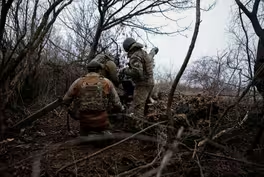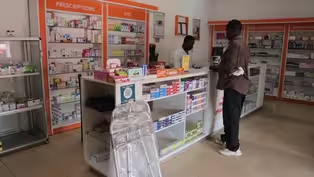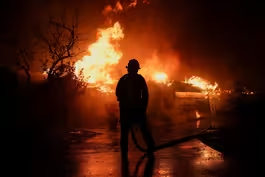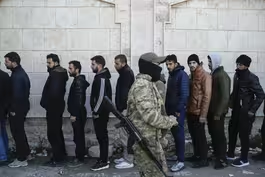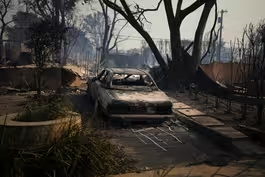
Buttigieg recaps transportation infrastructure improvements
Clip: 1/8/2025 | 9m 46sVideo has Closed Captions
Buttigieg recaps administration's efforts to improve transportation infrastructure
The tenure of Pete Buttigieg atop the Department of Transportation is coming to an end this month at a critical juncture for many of the industries the agency oversees. Buttigieg juggled crises in the rail and airline industries and oversaw the distribution of billions of dollars in funding from Biden’s infrastructure bill. Geoff Bennett sat down with Buttigieg as he prepares to leave office.
Problems playing video? | Closed Captioning Feedback
Problems playing video? | Closed Captioning Feedback
Major corporate funding for the PBS News Hour is provided by BDO, BNSF, Consumer Cellular, American Cruise Lines, and Raymond James. Funding for the PBS NewsHour Weekend is provided by...

Buttigieg recaps transportation infrastructure improvements
Clip: 1/8/2025 | 9m 46sVideo has Closed Captions
The tenure of Pete Buttigieg atop the Department of Transportation is coming to an end this month at a critical juncture for many of the industries the agency oversees. Buttigieg juggled crises in the rail and airline industries and oversaw the distribution of billions of dollars in funding from Biden’s infrastructure bill. Geoff Bennett sat down with Buttigieg as he prepares to leave office.
Problems playing video? | Closed Captioning Feedback
How to Watch PBS News Hour
PBS News Hour is available to stream on pbs.org and the free PBS App, available on iPhone, Apple TV, Android TV, Android smartphones, Amazon Fire TV, Amazon Fire Tablet, Roku, Samsung Smart TV, and Vizio.
Providing Support for PBS.org
Learn Moreabout PBS online sponsorshipGEOFF BENNETT: The tenure of Pete Buttigieg atop the Department of Transportation is coming to an end this month at a critical juncture for many of the industries the agency oversees.
The former presidential candidate and mayor of South Bend, Indiana, spent much of the Biden administration juggling crises in the rail and airline industries, navigating a high-stakes transition to electric vehicles, and overseeing the distribution of billions of dollars in funding from President Biden's infrastructure bill.
I spoke with him as he prepares to leave office.
Secretary Buttigieg, welcome back to the "News Hour."
PETE BUTTIGIEG, U.S. Secretary of Transportation: Thank you for having me on.
GEOFF BENNETT: You have spent your final weeks as transportation secretary touring the country, touting the Biden administration's policy achievements.
How do you see the infrastructure investments shaping the future of transportation in particular in this country?
PETE BUTTIGIEG: Well, I think the bottom line is that we are leaving the condition of America's transportation systems much better than we found them.
And a big part of that is the projects that we're funding through President Biden's infrastructure package.
The number now stands at 66,000 and counting in terms of projects getting support.
More than 10,000 of those are complete.
Many more are just entering into construction.
So we're creating a lot of jobs while we're at it, making our transportation systems better, safer.
It's not happening overnight.
The better part of this decade will continue to unfold with improvements all made possible by the work that we did during our four years here.
GEOFF BENNETT: On that point, President Biden in a new interview with USA Today said that he regrets the slowness of the infrastructure rollout.
He said: "Historians will talk about how great the impact was, but it didn't have any immediate impact on people's lives."
He continues: "I think we would have been a hell of a lot better off had we have been able to go much harder at getting some of these projects in the ground quicker."
What do you make of that?
How does that strike you?
PETE BUTTIGIEG: Well, I think what he's getting at is the nature of the beast here, where some of the most significant projects that are being funded, they're going to span multiple presidencies, and you don't always get the credit for that up front.
I think that we're already seeing some transformational effects, not just from the thousands of projects that are complete, but all of the jobs that have been created.
I was back in South Bend not long ago, where, when I was mayor, the number of people joining building trades, apprenticeships, getting jobs that we're seeing today would have been unthinkable.
But, of course, that's not the same as the project being complete.
That takes longer.
And we have faced a lot of structural factors that have made it hard to do projects as quickly as we have wanted.
We have made a lot of progress against that.
We have tripled the pace of getting grant agreements done as a department compared to the last administration.
We have cut the time for some of the most complicated environmental permitting processes.
By some measures, we have cut it in half.
But there is more to do to get these projects done and our country has more to do.
GEOFF BENNETT: Seven billion dollars being allocated for electric vehicle charging stations across the country.
Only 44 stations have been built nationwide so far; $42 billion dollars aimed at expanding broadband Internet service hasn't connected a single household.
Why not?
PETE BUTTIGIEG: Well, the electric vehicle charger program was designed to put most chargers in 2026, 2027, but the first few are already up and running.
We're talking about a transformation to the way that American vehicles have been fueled and supported, the likes of which we haven't seen in 100 years.
And we made some specific intentional choices, like making sure that we did that with made-in-America chargers versus just getting the cheapest equipment available from China.
I think that was the right thing to do.
Over time, we will see that that number will continue.
We have already doubled to about 200,000 the number of publicly available chargers on President Biden's watch.
And I believe that we will meet or exceed President Biden's target of having half-a-million chargers up by the end of this decade.
GEOFF BENNETT: Big picture question, because we have seen Democrats expend significant political capital aimed at passing legislation to help middle-class Americans that hasn't yielded direct political benefit or electoral gains.
I mean, what does that say about the relationship between policy achievements and voter perception?
PETE BUTTIGIEG: Sometimes, it takes time to get credit for good policy.
I think about, when I was first entering public life, the Affordable Care Act was something that was just killing us in 2010.
By the time I got here to Washington, it was something that even Republicans would say that they would try to protect.
Not sure whether I would believe them, but that's what they say.
It takes time sometimes for a policy achievement to be fully felt.
And that's especially true on something like infrastructure, where, again, some of the projects that we're working on are projects that will span multiple presidencies.
You think about the Hudson River Tunnel.
That's something that represents one of the biggest public works projects of our time in America, and will go well into the 2030s.
But, then again, we have thousands of projects that are already complete.
I think people are increasingly seeing the benefits of it.
One thing that I have noted is that even many legislators who voted against it among congressional Republicans are now trying to collect credit for the projects that are getting done.
That tells me that doing those good projects was good policy and good politics.
GEOFF BENNETT: Does it raise questions, though, about the political strategy behind pursuing these ambitious agendas if voters in real time don't seem to be responding to the programs and policies that are designed to help them?
PETE BUTTIGIEG: Well, when there are hundreds of factors affecting a given political moment or election outcome, you don't want to overread one or another.
The bottom line is that fixing America's transportation systems is the right thing to do.
We're doing it because it's the right thing to do.
And I think there will be more and more appreciation for that over time as well.
GEOFF BENNETT: Why do you think Democrats struggled to gain traction in this last election?
And what more needs to be done to win back voters and to go on the offensive on the issues that seemingly propelled Donald Trump back into the White House?
PETE BUTTIGIEG: Well, let me take care, according to campaign rules, that I can't get into campaigns and elections while I'm in a federal capacity today.
But what I will say is that, in addition to continuing to do good work, we have got to recognize that credit doesn't give itself out.
We need to continue making sure that we can connect the dots between a decision that was made in a big white building in Washington, D.C., and how your life is different, whether it's what you're paying for a dozen eggs or whether you have a safe way to get to work or what it's like to be an airline passenger.
We have made a lot of major improvements on all of those fronts.
I am certain that we are leaving every form of American transportation better than we found it.
But there's always more work to do.
And, look, we're in a -- just a radically different information environment than we were in just a few years ago.
We have never had more information coming at us.
And yet, in my lifetime, in many ways, we have never been less informed.
The editorial function of helping to separate fact from fiction, helping to establish one of the most important things that a citizen deserves to know, that function is on its back feet right now in a world where some guy on the Internet can be treated like they have just as much credibility as somebody who is holding themselves to the highest ethical standards of journalism.
Sorting through that, I think, in many ways will be the project of our time.
That matters not just politically, but societally, and certainly something that I hope to continue to be involved in, just as I have tried to use my time in this role not just to drive good policy work, but to help Americans understand what it means to them.
GEOFF BENNETT: What's the most surprising lesson you learned during your time in office?
PETE BUTTIGIEG: Well, there are so many different ways to get results.
And while we knew that getting federal funding out was going to be a big part of how we could make people's lives better, I found there are a lot of other tools that have made a big difference too.
Take airline consumer protection.
Some of that, we were able to do with rules and enforcement, but a lot of what prompted the airlines to change the way they treat passengers was us doing a lot of work just around transparency, empowering people with more information on Web sites like flightrights.gov, so they knew what they could demand of an airline and what an airline was promising.
It's just one among many examples that I found about the different tools and levers that exist in a place like Washington to get results for people.
And the other thing that I would say I was really surprised by is that, even in a very divided and polarized country, in a divided and polarized Washington, it was possible to get a lot of good work done across the aisle.
GEOFF BENNETT: With your tenure as transportation secretary coming to a close, do you see yourself continuing in public service, perhaps another run for elected office?
PETE BUTTIGIEG: I don't know.
I know what I care about.
I care about things like making sure that infrastructure and technology make people better off.
I care about places like where I grew up in the Industrial Midwest continuing to grow economically and to thrive and find a new future in the 21st century.
I care about the condition of our democracy and what kind of society we live in.
And I care about it in a whole new way now that Chasten and I have 3-year-olds at home who have more at stake than any of us in what that future is like.
I don't know what it'll exactly look like to work on those things, whether that's in and out of -- in or out of public life or public office, but I will find a way to work on those things.
GEOFF BENNETT: Well, you have certainly got your hands full with those 3-year-olds.
GEOFF BENNETT: Secretary Pete Buttigieg... PETE BUTTIGIEG: We do.
GEOFF BENNETT: ... thanks for joining us.
We appreciate it.
PETE BUTTIGIEG: Thanks.
Appreciate it.
Biden announces final Ukraine aid before Trump takes office
Video has Closed Captions
Clip: 1/8/2025 | 4m 56s | Biden administration announces its final aid package to Ukraine before Trump takes office (4m 56s)
Is U.S. foreign aid for health care being used effectively?
Video has Closed Captions
Clip: 1/8/2025 | 9m 29s | Is U.S. foreign aid for health care being used effectively? (9m 29s)
LA Crews struggle to stop fires fueled by historic winds
Video has Closed Captions
Clip: 1/8/2025 | 4m 37s | 'This is as bad as I've ever seen': Crews struggle to stop fires fueled by historic winds (4m 37s)
Syria's Alawites face uncertain future after fall of Assad
Video has Closed Captions
Clip: 1/8/2025 | 9m 35s | Syria's once-empowered Alawite minority faces uncertain future after fall of Assad (9m 35s)
Wildfires rage across LA, leaving neighborhoods in ruins
Video has Closed Captions
Clip: 1/8/2025 | 7m 58s | Massive wildfires continue to rage across LA area, leaving neighborhoods in ruins (7m 58s)
Providing Support for PBS.org
Learn Moreabout PBS online sponsorship
- News and Public Affairs

FRONTLINE is investigative journalism that questions, explains and changes our world.

- News and Public Affairs

Amanpour and Company features conversations with leaders and decision makers.












Support for PBS provided by:
Major corporate funding for the PBS News Hour is provided by BDO, BNSF, Consumer Cellular, American Cruise Lines, and Raymond James. Funding for the PBS NewsHour Weekend is provided by...

